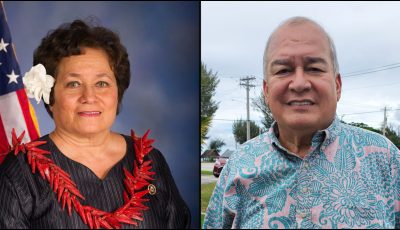BREAKING NEWS: Sablan, Murkowski reach agreement on CW bill
‘US Workforce Act’ introduced in House and Senate
WASHINGTON, D.C.—Delegate Gregorio Kilili Camacho Sablan (Ind-MP) announced today an agreement with leading members of Congress on legislation that gives the Marianas access to foreign labor for another 10 years and continues the trend to increase the number of local workers.
Sablan has been working with Sen. Lisa Murkowski, chairman of the Senate Energy and Natural Resources Committee, since July of 2017 on this long-term solution. Murkowski formed a working group to draft the new policy, with Sablan and key Republicans and Democrats from the Senate and the House to help ensure success of the legislation.
Murkowski and Sablan introduced the bill today in the Senate and the House.
“I thank chairman Murkowski and all the members of the working group,” Sablan said. “We have put in many long hours of discussion in person, on the phone, and by e-mail to reach this point of agreement.
“When we started, there were some in Washington who said ‘no extension.’ So, we have come a long way.
“We now have a solid foundation for a long-term labor policy for the Northern Mariana Islands. I am sure that there will be more fine-tuning in the days ahead, as we work for passage.”
Listening sessions
Sablan held extensive listening sessions over the last year with his constituents, including business people, workers, federal enforcement agents, and Commonwealth government officials. The legislation introduced today meets the major goals identified in those listening sessions.
The legislation continues for another 10 years, until 2029, special access to foreign workers for the Marianas economy.
It allows an increase in the number of CW permits to 13,000 beginning in fiscal year 2019—3,001 over the current cap. This would override the cap of 4,999 that the Department of Homeland Security announced for next year.
In addition to the CW permit program, by extending the transition period the Sablan/Murkowski bill also extends the current E-2C visa for investors who came in under CNMI immigration law. It extends the exemption from the national cap on H visas for temporary workers. And it extends the bar on claims of asylum, which is the underpinning for Chinese tourism to the Marianas.
The bill, also, provides a new permit system for foreign workers who have been in the Marianas for the last five years. Instead of annual renewal, the new CW-3 category will be good for three years. And CW-3 permits will be renewable for three years after the worker “touches back” in their home country for 30 days.
“The CW-3 permit will give our local businesses that have legacy workers more certainty year-in and year-out and reduce business costs. Although, business will still be required to pay annually into the training fund for local workers.
“The CW-3 permit will also provide a more stable situation for foreign workers and their families, who have become part of our community,” Sablan said.
Placing local workers into jobs
“The bill is also good for local workers,” Sablan explained. “We called it the U.S. Workforce Act, because the primary purpose is really to increase the number of Americans with jobs. And there are a number of incentives in the bill to encourage that.”
One of the main changes to the present system is a requirement that the Commonwealth government report annually on how many domestic workers have jobs.
Gov. Ralph DLG Torres emphasized the importance of this in his testimony before the Senate Energy and Natural Resources Committee last year in support of Sablan’s bill that became Public Law 115-53.
“[T]oday the CNMI can boast the highest ratio of domestic to foreign workers since the beginning of our modern economy in 1990,” the governor reported to Murkowski’s committee.
To encourage that trend to continue, the Sablan/Murkowski bill will require employers to get a foreign labor certification from the U.S. Department of Labor. This ensures that no local worker is passed over or pushed out of a job by a foreign worker.
The bill also provides for a targeted use of the training fund that employers pay into, and establishes goals for how many local workers will get jobs as a result of the training fee. As of Dec. 31, the Commonwealth has received $12.1 million in fees to train local workers for jobs in the Marianas economy.
And the Sablan/Murkowski bill reduces the number of CW permits available by 500 every year.
“We want to continue the transition to a U.S. workforce that the governor pointed to,” said Sablan. “And we want to take away the uncertainty and anxiety that occurs every year before the Department of Homeland Security announces what the cap will be.”
‘Ghost permits’ blocked
Sablan and Murkowski also take aim at “ghost permits,” the likely reason for the high number of CW applications now being rejected.
“Businesses that get hundreds of permits and then fail to put people to work, or in some cases try to sell permits overseas, are a probable cause of so many of the denials that we are seeing in real time,” Sablan said. “Our bill requires all businesses to prove they are actively using their CW permits. If not, they lose them.”
“And those permits will go back into the annual pool, so that legitimate businesses can have them instead.”
All in all, Sablan said he thinks that the input of so many people in the Marianas was key to getting today’s legislation written. “Of course, as in any negotiation, there is give and take. We did not get everything we wanted.
“But on the whole, I think we have a good bill that protects the Marianas economy, protects local workers, and gives all of us a greater sense of certainty about the future.
“Now, we just have to get it passed in Congress and signed by the President. There is more work ahead, but I continue to be confident that we can get this done.” (PR)



























